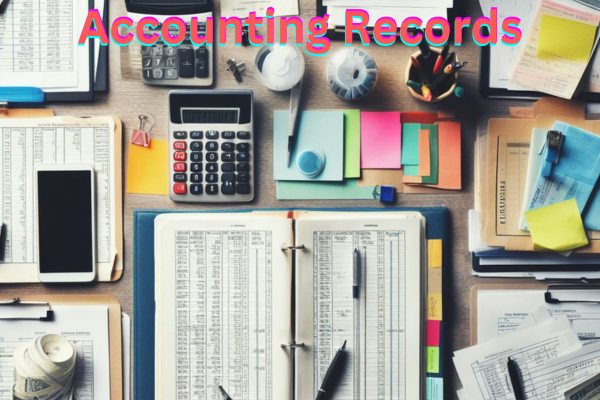Contents
Introduction of Accounting Records
In the realm of monetary management, accounting documents stand as the bedrock of sound decision-making. These complete information goals demystify the concept, unravelling the importance, features, benefits, and more than a few kinds of accounting records. Let’s embark on a trip to apprehend the pivotal function this information plays in shaping the monetary landscape.
What are Accounting Records?
Definition:
Accounting documents are particular and prepared documentation of a company’s monetary transactions. They embody a large array of documents, from receipts and invoices to ledgers and economic statements. These documents serve as the economic footprint of an entity, supplying a chronological and systematic view of its monetary activities.
Importance of Accounting Records
1. Tracking Financial Health
One of the principal features of accounting data is to provide a real-time picture of an organization’s economic health. Through meticulous recording and classification of transactions, this information permits groups to gauge their profitability, liquidity, and usual economic stability.
2. Facilitating Decision-Making
Accurate accounting information serves as a compass for decision-makers. Whether it is assessing the viability of new funding or strategizing for growth, having a dependable monetary record at your fingertips empowers companies to make knowledgeable and calculated decisions.
3. Ensuring Compliance
In the labyrinth of guidelines and tax codes, accounting files act as a shield. They furnish the imperative documentation to ensure compliance with tax legal guidelines and different regulatory requirements. This no longer solely mitigates felony dangers however additionally fosters transparency.
Features of Accounting Records
1. Comprehensive Documentation
At its core, accounting information embodies a range of documents, ranging from receipts and invoices to ledgers and monetary statements. This variety permits a holistic illustration of an organization’s economic journey.
2. Accuracy and Precision
The integrity of accounting data depends closely on accuracy. Every transaction needs to be recorded with precision to keep away from miscalculations that may lead to economic mismanagement and skewed decision-making.
3. Timeliness
Timeliness is paramount in the world of accounting. Recording transactions directly ensures that economic statements replicate the most present-day nation of affairs, enabling rapid responses to rising developments or challenges.
Benefits of Maintaining Accounting Records
1. Financial Transparency
Transparent economic information instils self-assurance in stakeholders. Whether it is investors, creditors, or regulatory bodies, clear and complete accounting documents construct belief by way of supplying an unobstructed view of an organization’s monetary performance.
2. Strategic Planning
Accounting data are precious equipment for strategic planning. They provide insights into areas of energy and weakness, supporting agencies in formulating and refining their long-term strategies.
3. Risk Management
Through historical data, accounting documents allow groups to perceive and mitigate monetary risks. Whether it is managing money float or navigating monetary uncertainties, a strong set of information acts as a compass for change management.
Types of Accounting Records
1. Ledgers
Ledgers shape the spine of accounting records. They are labelled into prevalent ledgers, which seize basic economic transactions, and subsidiary ledgers, which delve into precise money owed like bills receivable or bills payable.
2. Financial Statements
Financial statements, such as the earnings statement, stability sheet, and money glide statement, distil complicated monetary records into digestible summaries. These statements furnish a high-level overview of an organization’s monetary performance.
3. Receipts and Invoices
These are the constructing blocks of accounting records. Receipts and invoices serve as tangible proof of economic transactions, validating the entries made in ledgers and contributing to the typical accuracy and completeness of records.
Conclusion
In essence, accounting documents are no longer simply economic archives; they are the heartbeat of a business. From presenting insights for strategic planning to making sure compliance with regulations, their value can’t be overstated. By perceiving their features, benefits, and types, companies can harness the electricity of accounting archives to navigate the complexities of the economic panorama successfully. Embrace the readability and manipulation that meticulous accounting brings and pave the way for a sturdy monetary future.

Leave a Reply